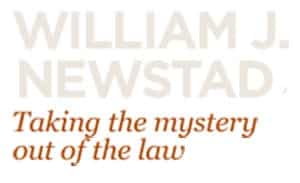Elder Law
Staten Island Attorney Offers Advice on Medicaid Eligibility & Planning
Guidance on allowances and exemptions for Medicaid patients
Medicaid is a federally funded assistance program operated by the individual states to help low-income Americans afford vital healthcare services. With implementation of the Patient Protection and Affordable Care Act of 2010 (ACA), state-run Medicaid programs have been expanded and are operating under new rules. At William J. Newstad, Esq., Attorney and Counselor at Law, we’re working to learn every nuance of the new law to better serve the needs of our senior clients.
New rules for Medicaid eligibility starting in 2014
In the past, Medicaid eligibility depended on an applicant’s total resources. Many middle-class seniors who required skilled nursing care relied on Medicare and private insurance until they exhausted those benefits. Then they paid out of pocket until their estate was so depleted that they qualified for Medicaid. At that point, they could enter a nursing facility that accepted Medicaid patients.
Elder law firms began to advise seniors that there were alternatives to impoverishing themselves and spending the legacy they hoped to leave to their children. Prudent seniors who consulted Medicaid planning attorneys learned how to transfer or structure their assets ahead of time, so they could qualify for Medicaid without divesting their assets.
However, starting in 2014, the ACA does away with the resource test. So, instead of looking at an applicant’s total financial picture, New York will only check income to make sure it is not more than 133 percent of the federal poverty level. That works out to about $15,800 a year for a single person. As long as your income does not exceed the Medicaid level, you can keep your home, your car and personal property. William J. Newstad, Esq., Attorney and Counselor at Law can help you qualify and handle your appeal if Medicaid denies your application.
Qualifying for benefits under the Medicaid Excess Income program
If your monthly income is more than the Medicaid level, you may still qualify for assistance with your medical bills. The difference between your income and the Medicaid level is your excess income, which acts like an insurance deductible. Once your healthcare providers bill you that amount for medical expenses, you can start receiving Medicaid assistance for your remaining medical bills. This process operates month to month.
Get current, reliable information about Medicaid planning from a Staten Island elder attorney
William J. Newstad, Esq., Attorney and Counselor at Law informs seniors and their families about their eligibility for government benefits, including Medicaid for long-term care. To schedule a free consultation in our office, or your home or nursing facility, call 718.815.5800 or contact our Great Kills Town office online.

718.815.5800
William J. Newstad, Attorney at Law is located in Staten Island, NY and serves clients in and around Staten Island, Breezy Point, Brooklyn, New York, Jamaica, Rockaway Park, Ridgewood, Maspeth, Long Island City, Howard Beach, Middle Village, Sunnyside, Woodhaven, Ozone Park, Woodside, Arverne, Elmhurst, Rego Park, Astoria, South Ozone Park, South Richmond Hill, Richmond Hill, Jackson Heights, Kew Gardens, Forest Hills, Corona, East Elmhurst, Inwood, Springfield Gardens, Bronx, Bronx County, Kings County, Nassau County, New York County, Orange County, Queens County, Richmond County, Rockland County, Suffolk County and Westchester County.





